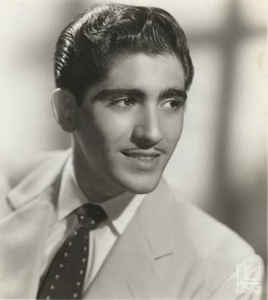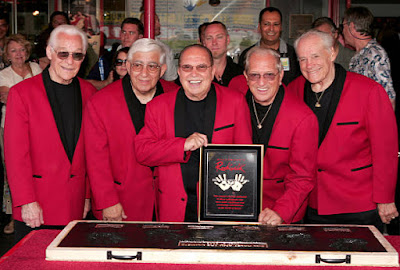John A. "Johnny" Grande (January 14, 1930 – June 3, 2006) was a founder member of Bill Haley and the Comets, playing piano on a string of singles that, if they were not actually the first rock'n'roll records ever made, arguably did more to codify and popularise the genre than any others.
Grande was born of Italian parentage in South Philadelphia, and ![]() initially pursued non-musical careers driving coal wagons and as a detective agency clerk. In his spare time, he played the accordion with whatever country or polka bands happened to be performing at Pennsylvania's Sleepy Hollow Ranch. Among those he sat in with was Bill Haley, then a yodelling country artist.
initially pursued non-musical careers driving coal wagons and as a detective agency clerk. In his spare time, he played the accordion with whatever country or polka bands happened to be performing at Pennsylvania's Sleepy Hollow Ranch. Among those he sat in with was Bill Haley, then a yodelling country artist.
 initially pursued non-musical careers driving coal wagons and as a detective agency clerk. In his spare time, he played the accordion with whatever country or polka bands happened to be performing at Pennsylvania's Sleepy Hollow Ranch. Among those he sat in with was Bill Haley, then a yodelling country artist.
initially pursued non-musical careers driving coal wagons and as a detective agency clerk. In his spare time, he played the accordion with whatever country or polka bands happened to be performing at Pennsylvania's Sleepy Hollow Ranch. Among those he sat in with was Bill Haley, then a yodelling country artist.At Haley's behest, Grande joined his backing band, the Four Aces of Western Swing: their first single, Candy Kisses, was released in 1948. Within a year, they had changed their name to the Saddlemen and ditched their straight country image. They stopped wearing stetsons onstage, Grande switched from accordion to ![]() piano, and in 1951, against Haley's wishes, they recorded a cover of black artist Jackie Brenston's Rocket 88: the original version of the song is widely credited as the first rock'n'roll record ever released.
piano, and in 1951, against Haley's wishes, they recorded a cover of black artist Jackie Brenston's Rocket 88: the original version of the song is widely credited as the first rock'n'roll record ever released.
 piano, and in 1951, against Haley's wishes, they recorded a cover of black artist Jackie Brenston's Rocket 88: the original version of the song is widely credited as the first rock'n'roll record ever released.
piano, and in 1951, against Haley's wishes, they recorded a cover of black artist Jackie Brenston's Rocket 88: the original version of the song is widely credited as the first rock'n'roll record ever released.Subsequent releases under their new name of the Comets, Rock the Joint, and the US top 20 hit, Crazy Man Crazy, further reflected the encroaching influence of black rhythm and blues on their sound. In 1954, they signed to Decca and recorded the bizarre Thirteen Women..The B-side of the disc was Rock Around the Clock.
Intended as a virtual parody of R&B conventions, the song's potential was spotted by DJs, but initially proved only a modest success. However, its follow-up, Shake, Rattle and Roll, sold more than a million copies in the US and, when Rock Around the Clock was included on the soundtrack of the film drama Blackboard ![]() Jungle (1955), it was re-released, becoming a transatlantic No 1 and eventually selling 25m copies.
Jungle (1955), it was re-released, becoming a transatlantic No 1 and eventually selling 25m copies.
 Jungle (1955), it was re-released, becoming a transatlantic No 1 and eventually selling 25m copies.
Jungle (1955), it was re-released, becoming a transatlantic No 1 and eventually selling 25m copies.Although primarily a piano player, Grande performed on accordion during most live shows as it was easier to transport than a piano, plus the hand-held instrument allowed him to participate more directly in the band's acrobatic instrumentals, such as "Rudy's Rock".
Over the next year, Haley and the Comets became the first bona fide rock'n'roll stars, releasing a string of hit singles and featuring in two movies, Rock Around the Clock and Don't Knock the Rock. By the end of 1956, however, Haley had been eclipsed by the arrival of ![]() Elvis Presley. While other members of the Comets came and went - usually departing as a result of disputes over money with their parsimonious leader - Grande remained loyal until 1962: he was a shareholder in the Comets and received a cut of the profits rather than the miserly wages Haley doled out to the rest of the band.
Elvis Presley. While other members of the Comets came and went - usually departing as a result of disputes over money with their parsimonious leader - Grande remained loyal until 1962: he was a shareholder in the Comets and received a cut of the profits rather than the miserly wages Haley doled out to the rest of the band.
 Elvis Presley. While other members of the Comets came and went - usually departing as a result of disputes over money with their parsimonious leader - Grande remained loyal until 1962: he was a shareholder in the Comets and received a cut of the profits rather than the miserly wages Haley doled out to the rest of the band.
Elvis Presley. While other members of the Comets came and went - usually departing as a result of disputes over money with their parsimonious leader - Grande remained loyal until 1962: he was a shareholder in the Comets and received a cut of the profits rather than the miserly wages Haley doled out to the rest of the band.Nevertheless, Haley and the Comets' diminishing commercial standing and punishing work schedule - the latter exacerbated by financial mismanagement that left Haley with a six-figure tax debt - eventually led to his departure. Ironically, Haley went on to further success after Grande left to teach music, and later become a restaurateur.
In the late 1960s and early 70s, Grande was a beneficiary of a ![]() burgeoning rock'n'roll revival: Rock Around the Clock became a hit again on both sides of the Atlantic in 1974, after it was used as the theme tune to the comedy series, Happy Days.
burgeoning rock'n'roll revival: Rock Around the Clock became a hit again on both sides of the Atlantic in 1974, after it was used as the theme tune to the comedy series, Happy Days.
 burgeoning rock'n'roll revival: Rock Around the Clock became a hit again on both sides of the Atlantic in 1974, after it was used as the theme tune to the comedy series, Happy Days.
burgeoning rock'n'roll revival: Rock Around the Clock became a hit again on both sides of the Atlantic in 1974, after it was used as the theme tune to the comedy series, Happy Days. It seemed symptomatic of the low regard in which the Comets were held that they were overlooked when Haley was posthumously inducted into the Rock And Roll Hall Of Fame in 1987. The snub roused Grande to reform the band, and begin touring and recording once more.
In the spring of 2006 the onset of ill health forced Grande to temporarily take a hiatus from the Comets, who at the time were engaged in a long-term gig at Dick Clark's American Bandstand Theatre in Branson, Missouri. He died in his sleep in Clarksville, Tennessee of cancer-related causes a few weeks later.
(Compiled and edited mainly from an article by Alexis Petridis for The Guardian)


